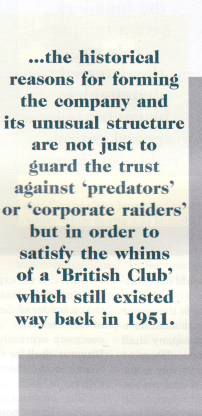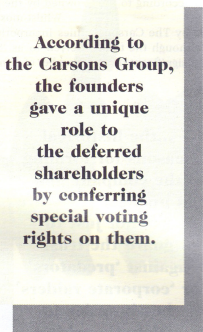It marked the end of an era for The Ceylon Guardian Investment Trust Limited (TCGITL), when four of its directors MTL Fernando, A M de S Jayaratne, Singha Weerasekera and Jivaka Weeratunge, resigned on the last day of December 1996.
It was a time to retire the old guard, with old norms and cultures ingrained by the British Raj, and a time for a new breed of corporate creatures to take over.
The old guard has been resisting this move for years. They were adamant that the company was formed, as its name indicates, “to guard” the investments in Plantation Companies against ‘predators’. They had devised a system to ensure that deferred shareholders who had 50 percent voting rights should not be given directorships, as it was their firm opinion that the management and ownership of the company had to be separate in order to safeguard the interests of the trust. However, the formula which has protected is line of thinking for years, has revealed a chink in its armour.
TCGITL was formed in the post-independence days of 1951 by the residue of Britishers still residest in Sri Lanka at that time. The trust was in the nature co-operative agency, the Junction of which was to apply the pooled funds of a group of small and Large investors in a wide variety of sound securities The immediate reused for the formation was, as described above, to guard the investments of the plantation Companies against the predators.
The Ceylon Guardian Investment Trust Limited has a subsidiary company and an associate company i.e.. The Ceylon Investment Company Limited and the Rubber Investment Trust Limited. Over the years, especially after the estates were taken over by the Government in 1974, the three companies have di- versified their investments and now hold shares in 154 out of the 233 companies quoted in the Colombo Stock Exchange, with a book cost of Rs 2,679,505,947/ and a market value of Rs 1.288 billion, as on March 31, 1996. TCGITL also has holdings in three Sri “Lanka bine chips namely, Hayleys Limited, Richard Pieris & Co. and Aitken Spence & Co. Ltd.
The three trusts were managed by a Board of five Directors who had a very small shareholding in the Trust Companies. Four of these directors resigned on December 31st, and the director JS Mather was replaced by a Carsons Group nominee on December 4th.
The Carsons Group consisting Carson Cumber batch & Company. The Hood Hope Company. The Indo-Malay Estates Ltd., The Selingsing Company Ltd.. The Shalimar (Malay) Estate Company Limited and Ceylon Finance & Securities L, (companies under the selvanathan flag) ad systematically bought shares in the company over the years: thereby, accumulating 15 percent ordinary shares and 22 percent preference shares.
In addition to these findings, they also accumulated 21 percent beneficial ownership 24 deferred shares, originally in the hands of the agency houses who wanted the plantation companies guarded, (however, a trust cannot be recognised according to the rules of the company).

A Requisition to TCGITL made by The Carsons Group on December 5th, says, “although the total holding of all our shares represent a significant ownership of the company we have never been adequately represented on the Board of the Company. During the last two years. we repeatedly requested the company to give us three seats on the Board but that request was continuously declined/refused on the grounds that owners of deferred shares should not have representations on the Board. For example, in the letter of March 2, 1995, the company stated that with regard to your request to be Directors of this Company, you are no doubt aware of the basis on which it was incorporated and the historical evolution of this company; a brief glance at the prospectus alone would make this clear. The company was structured on the basis that the Management of the Company and the Board should remain with independent managers and that owners of deferred shares should have neither representation of the board nor control over the management of the company.
In a contradictory statement Carsons Group insiders say that there is no such evidence whatsoever to substantiate any of the statements quoted by the outgoing directors of TCGITL.
According to their research, the historical reasons for forming the company and its unusual structure are not just to guard the trust against ‘predators’ or ‘corporate raiders but in order to satisfy the whims of a ‘British Club’ which still existed way back in 1951.
The Britishers in Sri Lanka and interested parties in their mother country, considering it prudent to give heed to the then emerging clamour for Sri Lankans to be given positions hitherto enjoyed by the British, started employing Sri Lankans in increasing numbers in many of the positions lower down the hierarchy such as executive officers in ageney houses, superintendents and assistant superintendents in estates all by the British at that time. Whilst most of the estates were owned by companies incorporated in the United Kingdom (then referred to as Sterling Companies), a considerable number of prime estates covering large extents of land were owned by companies incorporated locally known as rupee companies which belonged mainly to the British community then working in Sri Lanka. In the pre-independence years when they left Sri Lanka for good, some of them sold their shares to Britishers still living here and others continued to hold the shares during their retirement in the UK.
However, in the post-independence years whenever these shares came up for sale, either due to a Britisher working in Sri Lanka leaving our shores or due to the passing away of a re- tired officer resident in the UK. they were bought by Sri Lankans, simply because there was a dearth of Britishers in the country by that time.
Despite this, the Britishers strove to dominate and control Sri Lanka’s plantation economy and considered the acquisition of shares by Sri Lankans Rupee Companies, to be against their best interest. and every Annual General Me these Companies, to their management and basin practices, which were closely interwoven amongst their select few! To prevent this from happening they had to come up with a method to ensure that Rupee Company shares remained within the control of the ‘British Club’, even though the numbers of this club by then were on a rapid decline.
From that situation emerged the controversial Investment Trust. F C Rowan, an expat lawyer from the UK who was then a partner of the British law firm Julius & Creasy, formed ‘The Ceylon Guardian Investment Trust Limited’, along with six other Britishers by signing it’s Memorandum and Articles of Association on April 18, 1951. According to the Carsons Group, the founders gave a unique role to the deferred shareholders by conferring special voting rights on them, ‘as many votes as the number of votes conferred by all other shares for the time being issued.’ They thus ensured that the company will never be able to take a decision without the consent of the deferred shareholders.
In order to ensure that all deferred shares voted en bloc, all those shares were issued to a trustee company chosen by them (Jacey & Co.). The beneficiaries of the trust were without dispute the British-owned agency houses and brokers etc., who controlled the heights of local economy at that time, by dominating and controlling the plantation economy. Thus the top companies in the then prevailing economy were assured the means of collating were assured the means of collating and keeping under their ultimate control, for the long term, any shares that would have otherwise gone out of their magic circle.
Article 138 of the company, referring to the power given to the directors says, “the Directors shall have power to acquire … provided that the company shall not carry on the business of dealers, speculators or traders in stocks, shares, or securities of any company, corporation, Municipality or Government whether British, Colonial or Foreign or acquire the same, except for the purpose of their being held as investments and shall only realise the same from time to time for the purpose of varying investments. However, these whims of an ex-colonial power have ceased to exist for a long time now and major changes have taken place in the Sri Lankan economy, over the decades since Sri Lanka gaining independence.

As the Carsons Group Requisition to TCGITL points out “these desires are no longer of any relevance or interest to any one except to a student of history” Be that as it may, even though the incorporation of the company was brought about under these historical conditions, these conditions should not prevent the rightful shareholders of the company from electing Directors to the Board. It is clear that the desire of the promoters of the company was for the deferred shareholders to have total control.
“This unique structure of the company does not, as is alleged by some, enable it to act as a ‘predatory company or to assist others in acquiring and taking over other companies. In any event even if there is such a structure existing in the company which can be exploited by a ‘company raider’, the Company Take Overs and Mergers Code 1995, regulates by law, acquisitions and takeovers. Therefore, a takeover or an acquisition of a company can only be done by anyone whomsoever only according to law. Notwithstanding the foregoing, the requisitionists wish to unreservedly and categorically state here that they will not use the Company for such purposes.
Furthermore, even if as stated by the company in its letter of March 2, 1995, there are documents such as the prospectus to support their position, the Articles of Association of the company will override all such other documents including the prospectus.
There is no express or implied stipulation in the Articles of Association of the company to the effect that a holder of deferred shares cannot be a Director of the company. Article 105 of the Articles of the company expressly states that the qualification for a Director shall be the holding of at least 50 ordinary shares in the company”, the Carsons Group requisition to TCGITL says. The Carsons Group which holds a large percentage
of shares in the company, and according to them, rep- resenting not less than one-twentieth of the total voting rights of all the members, says, that there is no law or rule that precludes shareholders having representation on the Board of the Company and are firm in their opinion that the owners of the company should have sufficient voice in the Board. They said, “until Mr DCR Gunawardene was elected to the board last year, we did not have a single representative on the board of the company and in our view that is not adequate representation of the ownership of the company.
In order to achieve their objective, the Group has submitted their requisition to TCGITL, to pass a resolution to appoint two more of their nominees Israel Paulraj and Suvamal Chandranath Fernando as Directors to the Board of the Company.
Hence, we see the passing out of an old liege lord system and the beginning of a new era. How the company will prosper under the new reign or what the regulatory bodies would have to say about the move made by the Carsons Group, only time will tell.



